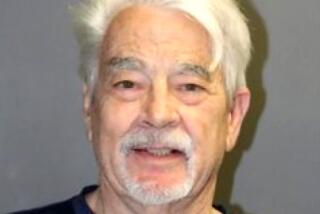Medical Board to Test Formula on Complaints : Discipline: The system will screen for seriousness of offense and characteristics of physicians. Some say it’s discriminatory.
SACRAMENTO — Attempting to speed up its enforcement efforts, the state medical board has developed a screening system to identify which complaints are most likely to result in the disciplining of physicians.
The board, which is in charge of licensing and disciplining California’s 78,000 practicing physicians, is expected to test the program in the coming year in at least one of its 12 regional field offices.
The unique screening system, which identifies some characteristics of physicians who are likely to exhibit incompetent or unethical behavior, was created through a study of 732 previous cases investigated by the board over the past three years that resulted in discipline. It will also screen for seriousness of offense and where the complaint originated.
The $66,000 study is intended to help investigators sort through a daunting number of complaints.
“We are overwhelmed. Anything that would streamline the investigation process and identify potential violators would help,” said Felix Rodriguez, supervising investigator in the board’s Santa Ana office.
Rodriguez said investigators sometimes can immediately identify “a heavy-duty case.” But often, he said, they are surprised to watch the scope of a complaint grow more serious and complex as an investigation unfolds. He said he is eager to discover if the screening mechanism will be a better predictor.
*
Complaints against the state’s doctors are on the upswing. Last year, the Medical Board of California received 8,757 complaints and this year the number is expected to exceed 10,000. These cases are shouldered by 100 investigators, each of whom handle an average of 45 cases at a time.
Dixon Arnett, the board’s executive director, recommended last March that the board adopt a case screening method.
“It is a management tool for us. It tells us how to invest our time and energy. Like most law enforcement organizations, we are understaffed and overworked. . . . We have to work smart as well as hard,” he said.
Bruce Hasenkamp, an attorney and president of the medical board, said he and other board members were excited by a recent presentation of the screening model. He expects the board to adopt the program on a trial basis at its next meeting in May.
In deciding which cases should get priority, the mathematical formula considers the seriousness of the complaint, giving greatest importance to fraud and lowest to unprofessional conduct. It also considers the source of the complaint. And it gives greater weight to whether the physician has been previously disciplined by the board.
But perhaps most intriguing, for each type of offense, the model lists specific physician characteristics that have been shown to increase the likelihood that an investigation will result in suspension or revocation of their licenses.
The characteristics considered are a physician’s age, specialty, the specific country where his or her medical degree was obtained, whether the doctor is board certified and whether a hospital already has taken disciplinary action against the doctor.
As an example, for complaints involving sexual misconduct, the model would highlight a physician who is over 60, in family practice, general surgery or general practice, not board certified and a graduate of a medical school in Argentina, Bangladesh, the United Kingdom or Mexico.
Similarly, an accusation that a physician is suffering from a mental illness is more apt to be red-flagged under the proposed system if the physician is under 45 years of age and not board certified.
And board investigators, the model says, should pay special attention to complaints about sexual misconduct, substance abuse, gross negligence, incompetence and improper drug prescribing when the doctor has been previously disciplined by a hospital for any reason.
Finally, in giving weight to who filed the complaint, the profile finds that particular sources often are more fruitful when it comes to certain offenses.
Some within the medical community contend that the criteria in the proposed formula may unfairly discriminate against the state’s many foreign-educated doctors, doctors who are not board certified and those in particular age categories.
Tim Shannon, associate vice president of government relations for the California Medical Assn., called it “a good idea (that) the board is attempting to prioritize cases. Too often in the past we felt that the board spends far too many of its resources on more or less minor offenses and not enough disciplining really egregious offenders.”
“But,” he added, “we have questions about some of the characteristics they are using.”
Shannon, who attended the presentation to the board this month, said he “pointed out that if a physician by chance was a foreign medical graduate who was not board certified, this system would move his case to the top of the pile. Those characteristics are not related to quality.”
Few doctors have had an opportunity to analyze the plan. But when the proposed guidelines were described to Dr. Richard Kammerman, a 64-year-old family practice physician who is past president of the Orange County Medical Assn., he too said they appeared “prejudicial against the foreign school graduate” for some offenses and against the older physician for others.
“I would feel a little nervous about them going out after the international graduate,” Kammerman said. “The foreign medical school graduates I know and have used in my practice have all been top-notch physicians.”
*
Dr. James Schubert, whose Sacramento consulting firm was hired to create the screening system, said it was designed by Doraiswamy Ramachandran, a professor of mathematics and statistics at Cal State Sacramento. The model was based on the last three years of cases that resulted in board disciplinary action, which means the revocation or suspension of physician licenses.
Schubert acknowledged that the program has shortcomings. He said he would like to add a “measurement of public harm” for ranking complaints against physicians, giving additional priority to those that involve a patient’s death or permanent disability.
However, medical board investigators noted that public safety already receives top consideration in determining which cases will get their immediate attention.
Schubert said the model was tested against 332 medical board cases that resulted in no disciplinary action. The screening system, with few exceptions, similarly gave them a low priority.
Now, Schubert said, he wants to field test the screening model for a year in one of the medical board’s regional offices to see if investigations there are more productive.
More to Read
Sign up for Essential California
The most important California stories and recommendations in your inbox every morning.
You may occasionally receive promotional content from the Los Angeles Times.










